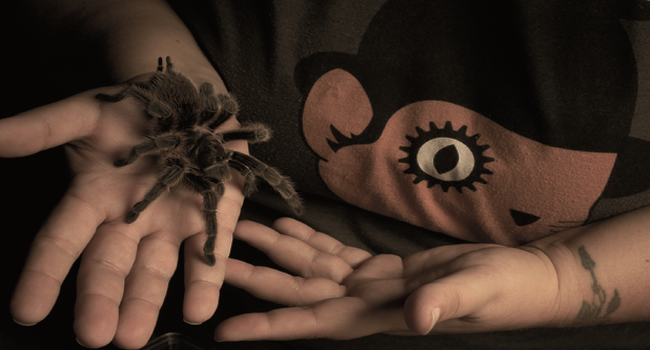Introduction
Arachnophobia and tarantula enthusiasts may seem worlds apart, but they are fascinated with spiders. This unique article will explore the intriguing differences and surprising similarities between these two groups. We’ll delve into what arachnophobia is, its causes, and its impact on individuals. In contrast, we’ll also uncover the world of tarantula enthusiasts, their love for these eight-legged creatures, and how they challenge the fear of spiders.
What is Arachnophobia?
Arachnophobia is a specific phobia characterized by an irrational and extreme fear of spiders. This intense aversion can lead to significant distress and impairment in daily life. Individuals with arachnophobia often experience anxiety, panic attacks, and avoidance behaviors when encountering spiders.
Causes of Arachnophobia
Several factors contribute to the development of arachnophobia, including genetics, environmental factors, and personal experiences. Understanding these causes is crucial for developing effective coping strategies.
How Arachnophobia Affects Daily Life?
Arachnophobia can affect daily life in various ways, from avoiding outdoor activities to experiencing heightened stress in indoor spaces. It can also lead to social isolation and difficulty maintaining a pest-free home.
Coping Strategies for Arachnophobia
Coping strategies for arachnophobia include exposure therapy, cognitive-behavioral therapy, and relaxation techniques. These methods help individuals confront their fears and manage their reactions.
What are Tarantula Enthusiasts?
On the other end of the spectrum, tarantula enthusiasts are individuals who have a deep fascination and affection for tarantulas, which are a type of spider. These enthusiasts are known for keeping tarantulas as pets and passionately studying these creatures.
The Fascination with Tarantulas
Tarantula enthusiasts are captivated by the beauty, diversity, and unique behaviors of tarantulas. Their enthusiasm often extends to breeding, collecting, and studying these arachnids.
Why People Keep Tarantulas as Pets?
Many people keep tarantulas as pets, considering them low-maintenance and fascinating companions. They appreciate the therapeutic effect of caring for these spiders, which can benefit individuals with anxiety.
Overcoming the Fear of Spiders
Surprisingly, some tarantula enthusiasts once had arachnophobia. By immersing themselves in the world of tarantulas, they’ve managed to conquer their fears and develop a profound appreciation for these spiders.
Tarantulas as Therapy Animals
More people are becoming aware of tarantulas as therapy animals. Their presence and the act of caring for them can help individuals with arachnophobia reduce their anxiety and gradually overcome their fear.
Similarities Between Arachnophobia and Tarantula Enthusiasts
Despite their contrasting views on spiders, arachnophobia and tarantula enthusiasts share a common fascination with these creatures. Both groups experience strong emotions when confronted with spiders, albeit in different ways.
Bridging the Gap
Understanding the perspectives of tarantula enthusiasts and individuals with arachnophobia can lead to greater empathy and acceptance. Closing the divide between these two groups might encourage cohabitation and lessen the stigma attached to arachnophobia.
Psychological
· Underpinnings
This section discusses the psychological factors that contribute to arachnophobia, such as evolutionary reasons, learned behaviors, and genetic predispositions.
· Symptoms and Reactions
Explore the common symptoms and reactions in individuals with arachnophobia, which may include panic attacks, increased heart rate, and avoidance behaviors.
Tarantula Enthusiasts
· Tarantula as Pets
Discover the unique characteristics of tarantulas, the reasons for the attraction of these arachnids as pets, and the advantages of having one as a pet.
Tarantula Enthusiast
· Communities
Explore the thriving communities of tarantula enthusiasts, where they share knowledge, experiences, and even breed these fascinating creatures.
Benefits of Owning
· Tarantulas
Discuss the positive aspects of being a tarantula enthusiast, including the therapeutic and educational benefits of keeping and caring for these arachnids.
Understanding the Divide : Bridging the Gap
This section delves into the efforts to bridge the gap between arachnophobes and tarantula enthusiasts, promoting understanding and tolerance.
Common Misconceptions
Explore the misconceptions and stereotypes associated with both arachnophobes and tarantula enthusiasts,
and the need to dispel them.
Coping Mechanisms
· Overcoming Arachnophobia
Discover the many methods and treatments that can help people live more fulfilled lives and get over their phobia of spiders.
Responsible Tarantula
Ownership
Discuss the responsibilities and ethical considerations associated with keeping tarantulas as pets, emphasizing the importance of conservation and proper care.
Arachnophobia: The Fear of Spiders
Coping Strategies
Arachnophobia can be highly distressing for those affected by it. However, there are strategies and
therapies available to help individuals manage their fear. Exposure therapy, a common approach, involves gradual and controlled exposure to spiders to desensitize the phobia. Cognitive-behavioral therapy (CBT) is another effective method that helps individuals change their thoughts and reactions to spiders.
Evolutionary Perspective
One of the theories explaining arachnophobia is rooted in our evolutionary history. Some scientists believe that early humans who had a fear of spiders were more likely to survive because some spiders can be venomous. This survival mechanism could have been passed down through generations, resulting in the prevalence of arachnophobia today.
Learned Behaviors
One can also learn about arachnophobia by seeing how classmates or parents respond to spider bites. If a child witnesses someone close to them displaying a fear of spiders, they are more likely to develop arachnophobia themselves.
Genetics
Arachnophobia may have a hereditary component, according to recent research. Some people may be more prone to this illogical dread due to a hereditary predisposition to phobias, such as arachnophobia.
Tarantula Enthusiasts: A Passion for Eight-Legged Creatures
· Unveiling the Appeal
For tarantula enthusiasts, these arachnids are a source of fascination. They are captivated by the diversity of tarantula species, their unique behaviors, and the thrill of observing their growth and molting.
· Educational Value
Many tarantula enthusiasts consider their hobby an educational pursuit. They appreciate the opportunity to learn about the natural world, animal behavior, and even arachnid conservation efforts.
· Community Bond
Tarantula enthusiasts form close-knit communities, both online and offline. They share their knowledge
and experiences and often collaborate to advance tarantula research and conservation.
Bridging the Gap: Understanding and Empathy
There is a push to bring tarantula fans and arachnophobes closer together. These consist of informational initiatives, support groups, and awareness campaigns. The ultimate goal is to lessen stigma and anxiety by fostering empathy and understanding.
Common Misconceptions
· Misconceptions About Arachnophobes
Although arachnophobics are frequently seen as weak or irrational, it’s crucial to recognize that phobias are real mental diseases. Help and compassion are vital for anyone struggling with arachnophobia.
· Misconceptions About Tarantula Enthusiasts
Some misconceptions about tarantula enthusiasts include the idea that they are reckless with dangerous spiders. In reality, responsible tarantula owners prioritize safety and conservation.
Coping Mechanisms: Overcoming Fear and Promoting Responsible Ownership
· Overcoming Arachnophobia
Individuals dealing with arachnophobia can take steps to overcome their fear. Seeking professional help, joining support groups, or even gradually exposing themselves to their fear in a controlled manner can be effective.
Responsible Tarantula
· Ownership
For tarantula enthusiasts, responsible ownership is paramount. This includes providing a suitable habitat, nutrition, and care for the spiders. Moreover, ethical tarantula enthusiasts often engage in conservation efforts to protect these remarkable creatures.
Conclusion
In conclusion, the worlds of arachnophobia and tarantula enthusiasts may seem like opposites, but they are interconnected through their shared fascination with spiders. While arachnophobia can be a debilitating condition, tarantula enthusiasts demonstrate that it’s possible to overcome the fear of spiders and even develop a deep affection for them.
FAQs
-
Can arachnophobia be treated successfully?
Indeed, arachnophobia may be handled using a variety of therapy modalities.
-
Are tarantulas dangerous pets?
Most tarantulas kept as pets are not harmful to humans, but some species can have potent venom.
-
Can tarantulas help with anxiety?
Many individuals find that caring for tarantulas can provide therapeutic benefits and help alleviate stress.
-
How common is arachnophobia?
Arachnophobia is one of the most common specific phobias, affecting millions of people worldwide.
-
Can exposure to tarantulas trigger arachnophobia?
Exposure to tarantulas can exacerbate arachnophobia in some cases, but it can also help individuals overcome their fear with proper guidance and support.







